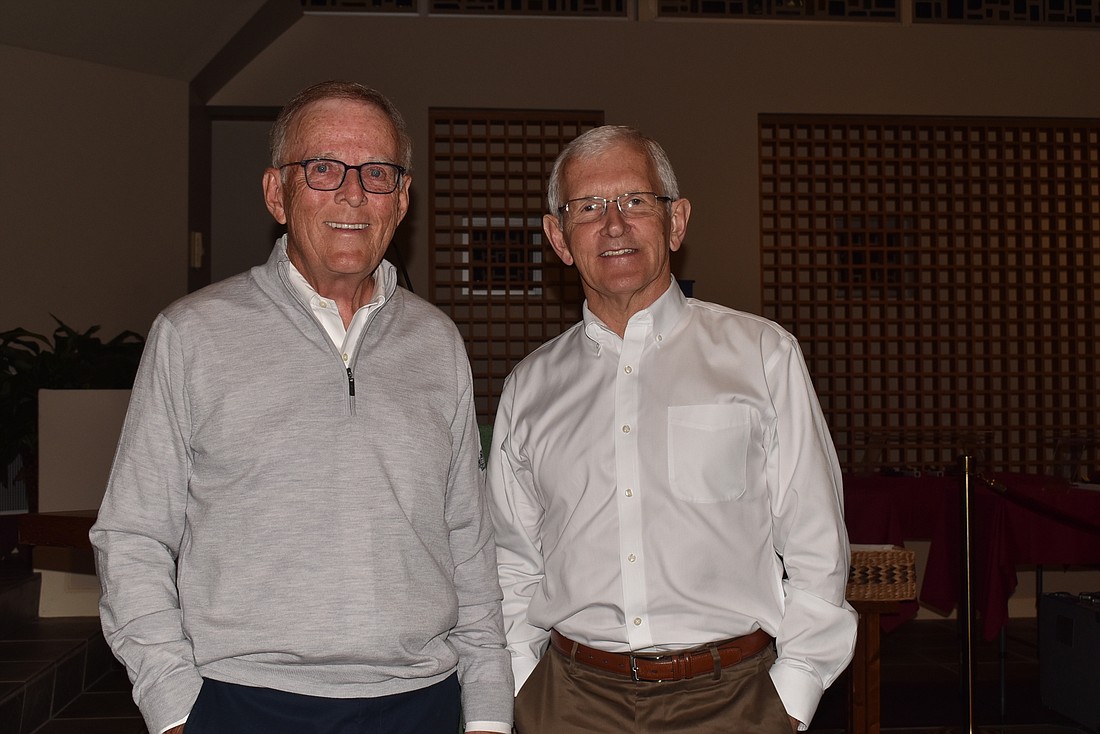- April 27, 2024
-
-
Loading

Loading

At St. Armands Key Lutheran Church, the first installment of the speaker series pulled no punches. Former U.S. Sen. Byron Dorgan, a senior fellow at the Bipartisan Policy Center, spoke on Nov. 15 about the lighthearted topic of modern challenges in government and increasing polarization.
“Somebody said to me, ‘Why? Why are you starting this series with a talk about politics? That's so polarizing?’” congregation President Steve Gunderson said. “Because this is when Byron Dorgan was available.”
The big swing and forced schedule served them well; it was the church’s largest group ever for a speaker, with 45 people live in the audience and another 45 livestreaming.
“We wanted the first series to be successful, but diverse,” Gunderson said. “If you don’t like X, then you might like Y. We discussed what might be good topics, speakers that might be compelling and people we had a connection with.”
The speaker series was developed by the church task forces, and the post-COVID task force was responsible for this idea.
“This was a very energetic group that looked at where we want to be in the future,” Gunderson said. “One task force member said that we do a lot well, but we could do more to engage with the community around us … I don’t think there was one person who said (the speaker series) was my idea. It evolved from the group.”
Dorgan a Democrat who served 12 years in the House and 18 in the Senate in the long-held Republican state of North Dakota, was the first speaker. Rev. Ken Blyth began with a prayer asking God for “eyes to see, ears to hear and hearts to understand.”
Gunderson, a former representative from Wisconsin who was in Congress at the same time as Dorgan and knew him well, introduced the man before he took the lectern. Dorgan gave a brief overview of his own background growing up in a rural North Dakota town in which shops on Main Street closed for local funerals and there were nine students in the graduating high school class. As he came up in the political world, he kept sight of the most vulnerable and overlooked residents of his state and advocated for Native Americans throughout his career. Though he and Gunderson were across the aisle from each other, they worked together several times throughout their careers.
“We served at a time when people wanted to work together,” Dorgan said. “It didn't matter what party you were from. This wasn't about your political party. It was about your country, and about your state, and what you could do to invest in what you could do to make things better in your state … Congress has changed dramatically. It has changed in ways that Steve (Gunderson) and I would have never knew back when we served. There's a volume and an anger and a disrespect about things that I never expected. And some of it comes from social media.”
Rather than run through the laundry list of stances on current issues in the country, Dorgan’s initial discussion focused on important moments throughout his career that made him proud to be an American, including advocating for the Indian Health Care Improvement Act within the Affordable Care Act and when he heard from a French politician about the impact and relief Americans brought to the French during World War II.
Afterwards, he took questions, which most often related to the difficulties of holding office as a Democrat in a historically Republican state, the importance of civil discourse and the changing nature of American politics. In his experience, members of the two parties got together on the weekends in Washington, spoke as humans to each other more often and were more willing to compromise.
“That has not been the case in more recent years, and it's a group of people who have decided that we're going to tell the American people, ‘You don't have to compromise and we're not intending to compromise,’” Dorgan said. “Well, the fact is, compromise is the lubrication of democracy. If you feel very differently than I do on something, it's important that we talk and we respect each other, and we see is there is there some little movement, at least a move down the road in the right direction.”